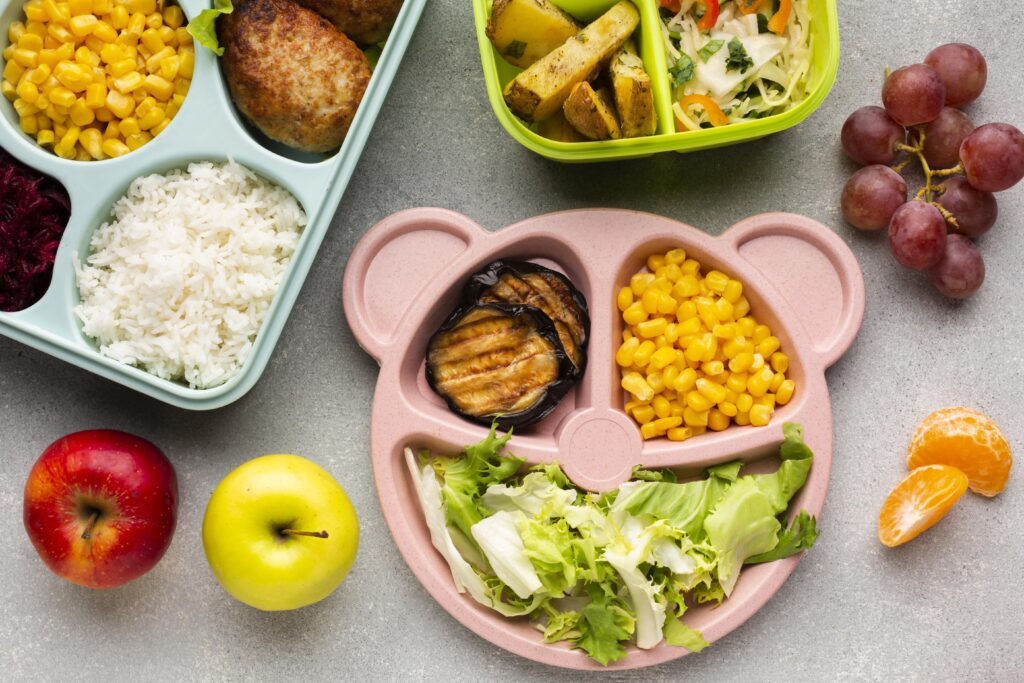A strong immune system is vital for every child’s growth and protection against daily infections. During the developmental years, children encounter countless viruses, bacteria and environmental stressors. Proper nutrition plays a central role in building and maintaining this defence system. Healthy food for kids provides the essential nutrients that allow their immune cells to function effectively and respond to potential threats.
Why Healthy Foods for Kids Nutrition Matters for Children’s Immunity
Children’s immune systems are still developing which makes them more vulnerable to illnesses. Their diet must include a variety of nutrients such as vitamins A, C, D, E, zinc and iron, all of which directly influence immune strength.
A diet full of fruits, vegetables, whole grains, lean proteins and dairy products helps produce antibodies and strengthens white blood cell function. Conversely, diets high in processed foods, sugars and saturated fats can impair immune performance and increase the risk of infections.

Essential Healthy Foods for Kids for a Strong Immune System
Certain nutrients play particularly important roles in boosting immunity
- Vitamin C – Found in oranges, kiwi, strawberries and bell peppers, it enhances white blood cell activity.
- Vitamin D – Supports immune regulation and is crucial for bone health. It is obtained from sunlight exposure and foods like fortified milk or eggs.
- Zinc – Found in nuts, seeds, lentils and seafood, it helps produce and activate immune cells.
- Iron – Prevents anaemia and supports oxygen transport, vital for immune function.
- Omega-3 Fatty Acids – Present in fish and walnuts, these reduce inflammation and improve cell signalling in immunity.
Healthy Kid-Friendly Meals for Picky Eaters
Many parents face the challenge of feeding picky eaters who reject healthy options. The key is creativity and presentation.
Offer colourful meals that combine flavour with nutrition such as fruit smoothies, vegetable-stuffed wraps or baked sweet-potato fries. Blending vegetables into sauces or adding finely grated carrots or zucchini to pasta dishes ensures kids get nutrients even when they resist vegetables on their own.
Children tend to prefer foods that look appealing. Cutting sandwiches or fruits into fun shapes and serving meals in vibrant bowls can encourage them to try new things. Involving children in simple cooking activities also sparks curiosity and a sense of ownership, making them more likely to enjoy the food they helped prepare.
Easy Healthy Meals for Kids
For parents balancing busy schedules, convenience and nutrition can go hand in hand. Healthy Foods for Kids should combine simplicity, taste and high nutritional value.
Options include grilled chicken with brown rice and steamed vegetables, vegetable omelettes, lentil soups or rice bowls with lean proteins and fresh salads. These meals are quick to prepare and provide the perfect balance of macronutrients, carbohydrates for energy, protein for repair and fats for brain function.
Healthy Breakfast for Kids
Breakfast is the foundation of a child’s daily nutrition. After a night of fasting the body needs a steady energy source to activate metabolism and concentration.
A healthy breakfast for kids should include a mix of complex carbohydrates, proteins and fiber. Oatmeal with banana slices, boiled eggs with whole-grain toast or yogurt parfaits with berries are excellent options.
Skipping breakfast can lead to fatigue and poor focus in school while regular nutritious breakfasts improve immunity and cognitive function.
Healthy Breakfast Muffins for Kids
For children who prefer grab-and-go meals, healthy breakfast muffins for kids are a practical solution. These can be made from whole-wheat flour, oats, honey and natural fruits such as apples or bananas.
Adding grated vegetables like carrots or zucchini provides extra nutrients without changing the taste. These muffins are rich in fiber, vitamins and antioxidants, helping support digestion and immunity. Parents can bake them in batches and store them for school mornings to ensure consistent healthy eating.
Healthy Lunch Ideas for Kids
Lunch plays a critical role in maintaining energy levels throughout the school day. It should include lean proteins, complex carbs and colorful vegetables.
Healthy lunch ideas for kids include grilled chicken wraps, lentil and vegetable rice, whole-grain pasta with vegetables or turkey sandwiches with avocado. Adding a small serving of fruit or yogurt ensures balance and variety.
Hydration is equally important; encourage children to drink water or fresh fruit juices instead of carbonated drinks to support detoxification and metabolic health.
The Role of Gut Health in Immunity
Nearly 70% of the immune system is located in the gut. This means that maintaining digestive health directly affects immune strength.
Probiotic-rich foods such as yogurt, kefir and fermented vegetables enhance the growth of good bacteria that protect the body from pathogens. Prebiotic foods like bananas, oats, garlic and onions, feed these beneficial bacteria and keep the gut balanced.
A healthy gut microbiome ensures better nutrient absorption and reduces inflammation, both essential for immune efficiency.
Protein and Micronutrient Support
Protein is the building block of all body tissues, including immune cells. Children require adequate amounts to support growth, recovery and resistance to infections.
Lean meats, eggs, lentils, beans and dairy are excellent protein sources. Micronutrients like zinc, selenium and iron strengthen the immune system’s ability to fight illness. Iron deficiency can lead to anaemia, lowering oxygen levels and weakening immunity.
Vitamin D and Sunlight Exposure
Vitamin D deficiency is increasingly common among children who spend most of their time indoors. This vitamin modulates the immune system, helping it respond effectively to infections.
Encouraging outdoor activities for at least 15 minutes daily helps maintain healthy vitamin D levels. Fortified foods like milk, eggs and cereals can also contribute to the requirement. However, overexposure to sunlight should be avoided by following proper skin protection measures.
Lifestyle Factors that Support Immunity
Nutrition is the cornerstone of immunity but lifestyle choices play supportive roles
- Regular Physical Activity – Promotes blood circulation and improves immune cell movement.
- Adequate Sleep – Essential for releasing protective cytokines that combat infections.
- Emotional Well-Being – Reduces stress hormones that suppress immune function.
Creating a calm, balanced home environment contributes as much to immunity as diet itself.
Common Mistakes Parents Make
Parents sometimes unintentionally weaken their child’s immune system by relying on highly processed foods. Packaged snacks, sugary cereals, and fast foods are low in nutrients and high in additives that cause inflammation.
Instead of opt for whole, natural foods and encourage moderation in treats. Another common mistake is irregular meal timing, consistent schedules help regulate metabolism and digestion. Lastly, neglecting food hygiene can undo all efforts toward healthy eating. Always wash fruits and vegetables thoroughly, cook meats properly and teach children about hand hygiene.
Parental Role and Healthy Habits
Children mimic their parents’ behaviour. When parents eat fruits, vegetables and home-cooked meals regularly, children view these as normal choices. Family meals free from distractions such as television or mobile devices, encourage mindful eating.
Patience is key, introducing new foods gradually and maintaining a positive attitude toward nutrition fosters long-term acceptance. Small changes such as replacing fried snacks with baked or roasted ones, lead to lasting improvements in diet quality.
Long-Term Benefits of Healthy Eating
Consistent healthy eating does not just protect children from immediate illnesses, it also builds a foundation for lifelong wellness. Strong immunity during childhood leads to fewer infections, better energy levels and improved school performance.
Balanced diets also lower the risk of obesity, diabetes and heart disease later in life. Teaching children the importance of Healthy Foods for Kids early prepares them to make informed food choices as adults.
Frequently Asked Questions
- What foods help boost a child’s immune system naturally?
Fresh fruits, vegetables, lean proteins, whole grains and probiotic foods like yogurt all enhance immune defence. - How can I get picky eaters to eat healthy foods?
Introduce new foods gradually, mix them with favourite and use creative presentations like colourful plates or fun shapes. - Are supplements necessary for healthy kids?
Not usually. Balanced diets provide enough nutrients but pediatric guidance is recommended for deficiencies. - How important is breakfast for children’s immunity?
Extremely important, it provides energy and nutrients that activate metabolism and immune responses for the day. - Can I replace store-bought snacks with homemade ones?
Yes. Homemade snacks like fruit yogurt, granola bars and vegetable muffins are healthier and free from preservatives. - What are the best protein sources for kids?
Eggs, chicken, fish, lentils, beans and dairy deliver high-quality protein essential for growth and immunity. - How much water should kids drink daily?
Typically 5 to 8 glasses, depending on age and activity. Hydration supports metabolism and toxin removal. - Are dairy products Healthy Foods for Kids for immunity?
Yes, especially yogurt and milk which contain probiotics and vitamin D to strengthen immune health. - What should a balanced school lunch include?
A mix of protein, carbohydrates, fruits or vegetables and healthy fats, like a whole-grain sandwich, yogurt and fruit. - When will I notice improved immunity after dietary changes?
Visible benefits appear within weeks, but consistent healthy eating over months leads to stronger long-term results.
Conclusion:
Healthy foods for kids form the backbone of a robust immune system. By focusing on balanced meals, colourful fruits and vegetables and natural sources of vitamins and minerals, parents can help children fight infections more effectively and thrive in every aspect of life.
From healthy breakfast for kids to easy healthy meals for picky eaters, every small dietary improvement contributes to stronger immunity and better overall well-being. The goal is not perfection but consistency, nurturing children to value wholesome foods today ensures a healthier generation tomorrow.

